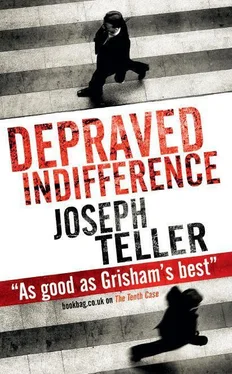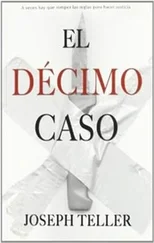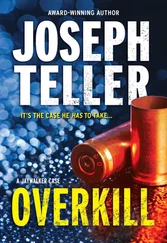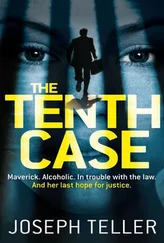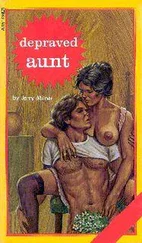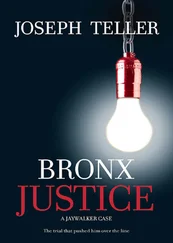Joseph Teller - Depraved Indifference
Здесь есть возможность читать онлайн «Joseph Teller - Depraved Indifference» — ознакомительный отрывок электронной книги совершенно бесплатно, а после прочтения отрывка купить полную версию. В некоторых случаях можно слушать аудио, скачать через торрент в формате fb2 и присутствует краткое содержание. Жанр: Криминальный детектив, на английском языке. Описание произведения, (предисловие) а так же отзывы посетителей доступны на портале библиотеки ЛибКат.
- Название:Depraved Indifference
- Автор:
- Жанр:
- Год:неизвестен
- ISBN:нет данных
- Рейтинг книги:3 / 5. Голосов: 1
-
Избранное:Добавить в избранное
- Отзывы:
-
Ваша оценка:
- 60
- 1
- 2
- 3
- 4
- 5
Depraved Indifference: краткое содержание, описание и аннотация
Предлагаем к чтению аннотацию, описание, краткое содержание или предисловие (зависит от того, что написал сам автор книги «Depraved Indifference»). Если вы не нашли необходимую информацию о книге — напишите в комментариях, мы постараемся отыскать её.
Depraved Indifference — читать онлайн ознакомительный отрывок
Ниже представлен текст книги, разбитый по страницам. Система сохранения места последней прочитанной страницы, позволяет с удобством читать онлайн бесплатно книгу «Depraved Indifference», без необходимости каждый раз заново искать на чём Вы остановились. Поставьте закладку, и сможете в любой момент перейти на страницу, на которой закончили чтение.
Интервал:
Закладка:
THE COURT: Mr. Mermelstein, have you had an opportunity to confer with the witness?
MERMELSTEIN: Yes, Your Honor.
THE COURT: Are we ready to proceed?
MERMELSTEIN: Yes, but THE COURT: Good. Bring in the jury.
Even as the jurors entered, they took in Sheetz's absence and Mermelstein's presence. Jurors don't miss much, Jaywalker had come to learn. They got things wrong every now and then, for which he was mostly grateful. But they didn't miss much.
The judge apologized for keeping them waiting, and instructed them to refrain from speculating about the cast change. Then she told Jaywalker to continue his examination.
JAYWALKER: Right before the recess, Mrs. Drake, I asked you which one of you got behind the wheel of the Audi, and which one of you got into the passenger seat. Do you recall that question?
Before answering, Amanda looked over at Mermelstein. Only when he nodded did she look back at Jaywalker.
AMANDA: Yes.
JAYWALKER: I ask you that same question again now, Mrs. Drake. Who was driving the Audi that evening, you or your husband?
Just as there can come a Moment in a trial when everything changes, so too can there come a Question upon which everything hinges. This was such a question. If Amanda were to say, "I drove," the entire direction of the trial would change. She would tell a story totally different from the one Carter had. There would be no wasp, no accidental loss of control of the car, no desperate attempt to steer it back into its lane or force the stick shift into a lower gear. Instead, she'd take full responsibility for everything that had happened. Then Abe Firestone would do his best to expose her as a liar, intent on saving her husband. What the jury would do was anyone's guess. And if they saw fit to acquit Carter, Amanda would probably end up wearing handcuffs as a reward for her honesty.
On the other hand, if she were to say, "He drove," that declaration, combined with Carter's earlier insistence that he had been behind the wheel, would likely be the nail in her husband's coffin. No left-handed versus righthanded slip, no why-he-couldn't-reach-the-clutch theory was going to be enough for Jaywalker to pull the rabbit out of the hat at that point.
So which was she going to do?
Way back in grammar school, a million years ago, a young Harrison J. Walker and the rest of his class had been assigned to read a famous short story, compose their own endings to it, and read them aloud. The story was called "The Lady and the Tiger," and it was set thousands of years ago, back in the time of gladiators. A young man has been imprisoned in a dungeon and told that it will be his fate to be thrown into the ring for the king's amusement. During the fortnight while he waits, a princess comes to visit him, and over time the two of them fall in love. On her final visit, she tells the prisoner that on the very next day he will be led into the ring, where he will find two solid doors. Hidden behind one door will be a ravenous tiger, starved for weeks. Should he choose that door, he'll be ripped apart and devoured alive. Behind the other door will be a beautiful lady. Should he be lucky enough to choose that door, he'll be freed to wed her, go off with her, and live happily ever after. The princess then confides that she's learned which door holds the lady, and which holds the tiger. "Choose the left door," she whispers.
What the prisoner must decide, of course, is whether to trust the princess. Has her love led her to save his life, or has it been trumped by her jealousy? In the end, he decides to trust her, and chooses the left door. The last two lines of the story read: "So I leave it up to you, dear reader. Which came through the door, the lady or the tiger?"
Jaywalker was the author now. By posing the question "Who was driving the Audi that evening, you or your husband?" he was forcing Amanda to choose a door. And in doing so, she would once and forever reveal her true self and seal her own fate. Either she was Amanda the selfless, who would save her husband at her own expense, or she was Amanda the selfish, who would doom her husband in order to save herself.
Which would she be, the lady or the tiger?
And the funny thing was, he could still remember the ending he'd composed to the story, almost word for word. Even as his seventh-grade classmates had taken sides, most of the girls writing that true love would prevail and it would be the lady who'd come out, and most of the boys opting for envy and the tiger, young Jaywalker had refused to do so. Why did it have to be one or the other? he'd asked himself. Why did he have to follow the rules? So at the moment of truth, right before the prisoner would be forced to make his choice, Jaywalker had had the princess gather up her skirts, leap over the barrier that separated the spectators from the ring, and make her way to the door on the right, the one that she knew held back the tiger. Just as she reached for the lever that would spring the door open, the king rose, shouted, "No!" and declared the spectacle over, as well as all future gladiator events, slavery, war, famine and homework. And the princess's reward for her bravery was that she, and not the lady hidden behind the other door, would be permitted to wed the prisoner, go off with him, and live happily ever after.
The teacher, whose job it had been to judge the endings and grade them, had given Jaywalker a failing mark, citing not only his sarcasm, but his refusal to ultimately answer the question. Still, judging from the spontaneous outburst of applause as he returned to his seat, Jaywalker knew he'd won something more important: the approval of his classmates. And in that split second, a trial lawyer had been born, a trial lawyer willing to break rules, flout convention and defy judges, all so that he could convince those whose votes really mattered. P eers, they were called. As in a jury of one's peers.
And just as he'd managed to figure things out back then, it suddenly dawned on Jaywalker that history was about to repeat itself. His question had presented Amanda with a choice, what sounded like an either-or proposition. But it was a false choice. And just as the young Jaywalker had refused to commit to one door or the other, so too was Amanda going to refuse.
She wasn't going to choose.
She wasn't going to save her husband, but she wasn't going to sacrifice herself, either. She didn't have to.
He asked her again.
JAYWALKER: Who was driving the Audi?
AMANDA: On the advice of counsel, I refuse to answer on the ground that doing so might in-in-in MERMELSTEIN: Incriminate.
AMANDA: Might incriminate me.
FIRESTONE: Objection! Objection! She can't do that!
THE COURT: Jurors, I hate to do this, but I'm afraid I'm going to have to confer with the lawyers. It seems we have some business to attend to.
Once the jury had been led out, Justice Hinkley cleared the rest of the courtroom, as well. A lot of reporters grumbled, but the judge was in no mood to argue. "Sue me," she told them.
As soon as the last of them had left, the judge announced that, having been warned earlier, Abe Firestone was now being held in contempt for his outburst, and would be spending the night in jail. "Now," she said to him. "Suppose you tell me why the witness cannot invoke her Fifth Amendment privilege."
"Because she started answering questions, and then stopped when she didn't like the question." The voice wasn't Firestone's, but David Kaminsky's. "She can't pick and choose."
Instead of asking Jaywalker to respond to that, the judge turned to Amanda's new lawyer. For once, Jaywalker was to be nothing but a bystander, albeit a very interested one.
"She's not picking and choosing," said Judah Mermelstein. "You asked me to confer with her, and I did. I determined that she's in real jeopardy of incriminating herself, however she testifies. You asked me to advise her, and I did. I advised her to refuse to answer all questions that go in any way, directly or indirectly, to the issue of who was driving."
Читать дальшеИнтервал:
Закладка:
Похожие книги на «Depraved Indifference»
Представляем Вашему вниманию похожие книги на «Depraved Indifference» списком для выбора. Мы отобрали схожую по названию и смыслу литературу в надежде предоставить читателям больше вариантов отыскать новые, интересные, ещё непрочитанные произведения.
Обсуждение, отзывы о книге «Depraved Indifference» и просто собственные мнения читателей. Оставьте ваши комментарии, напишите, что Вы думаете о произведении, его смысле или главных героях. Укажите что конкретно понравилось, а что нет, и почему Вы так считаете.
